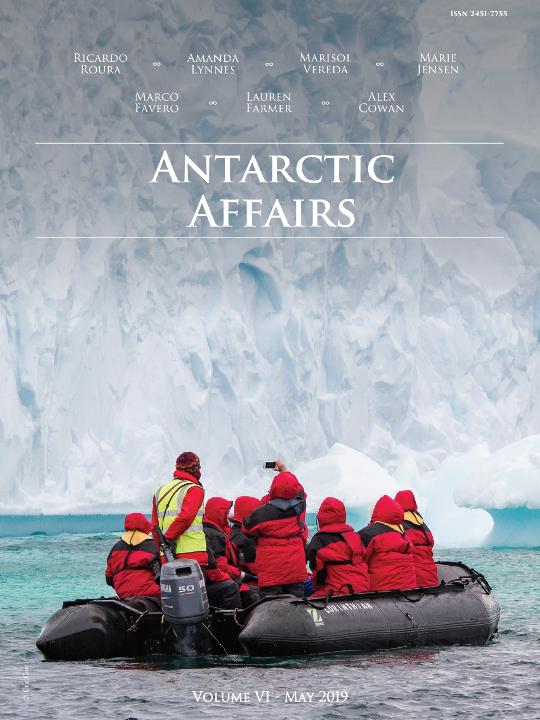Mostrar el registro sencillo del ítem
dc.contributor.author
Favero, Marco

dc.date.available
2021-01-11T15:07:51Z
dc.date.issued
2019-06
dc.identifier.citation
Favero, Marco; Antarctic Tourism. An Essay on Contrasts Between Environmental Impact, Current Regulations and Opportunities to Generate Environmental Awareness; Agenda Antártica; Antarctic Affairs; VI; 6-2019; 53-59
dc.identifier.issn
2451-7755
dc.identifier.uri
http://hdl.handle.net/11336/122209
dc.description.abstract
Although Antarctica is commonly considered a pristine environment it is a part of the world that has been visited for more than 200 years for exploration, exploitation of renewable resources, militarization,science and more recently tourism. The flow of tourists has increased significantly since its inception,reaching current values that exceed 45,000 tourists annually, featuring a marked seasonality and a high spatial density. This spatial-temporal concentration has required, from IAATO and in line with current regulations within the Antarctic Treaty System, a proactive agenda with the progressive development of operational regulations. A factor that cannot be ignored is that tourism, associated with current climate processes and their effect on the biodiversity and their habitats, can exacerbate the impact of tourism activity. Other aspect, although not necessarily circumscribed to it, is the potential for introducing non native species into the environment, incorporated into the agenda of the Antarctic Treaty System and taken proactively by industry through the design of protocols that require the implementation of strict biosecurity measures. In contrast to the potential or actual negative effects on the Antarctic environment, it is worthhighlighting the value of the educational programs implemented on board as a tool to transfer conservation values over Antarctica. The challenge for multilateral organizations is to achieve a broad understanding of the tourism activity, and to develop and refine regulations that prevent impacts that exceed the resilience capacity of the environment and its fauna. For IAATO the challenge will be to ensure that its members continue developing activities within a framework of growing and more sophisticated regulations aimed at further improving the performance of operations on land and at-sea, to minimize the impact of tourism over the Antarctic environment.
dc.format
application/pdf
dc.language.iso
eng
dc.publisher
Agenda Antártica
dc.rights
info:eu-repo/semantics/openAccess
dc.rights.uri
https://creativecommons.org/licenses/by-nc-sa/2.5/ar/
dc.subject
Antartida
dc.subject
Turismo
dc.subject
Conservacion y manejo
dc.subject
Impacto antropico
dc.subject.classification
Otras Ciencias de la Tierra y relacionadas con el Medio Ambiente

dc.subject.classification
Ciencias de la Tierra y relacionadas con el Medio Ambiente

dc.subject.classification
CIENCIAS NATURALES Y EXACTAS

dc.title
Antarctic Tourism. An Essay on Contrasts Between Environmental Impact, Current Regulations and Opportunities to Generate Environmental Awareness
dc.type
info:eu-repo/semantics/article
dc.type
info:ar-repo/semantics/artículo
dc.type
info:eu-repo/semantics/publishedVersion
dc.date.updated
2020-11-26T17:49:10Z
dc.journal.volume
VI
dc.journal.pagination
53-59
dc.journal.pais
Estados Unidos

dc.journal.ciudad
Washington DC
dc.description.fil
Fil: Favero, Marco. Universidad Nacional de Mar del Plata; Argentina. Consejo Nacional de Investigaciones Científicas y Técnicas. Centro Científico Tecnológico Conicet - Mar del Plata. Instituto de Investigaciones Marinas y Costeras. Universidad Nacional de Mar del Plata. Facultad de Ciencias Exactas y Naturales. Instituto de Investigaciones Marinas y Costeras; Argentina
dc.journal.title
Antarctic Affairs
dc.relation.alternativeid
info:eu-repo/semantics/altIdentifier/url/http://www.agendaantartica.org/
Archivos asociados
